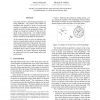Free Online Productivity Tools
i2Speak
i2Symbol
i2OCR
iTex2Img
iWeb2Print
iWeb2Shot
i2Type
iPdf2Split
iPdf2Merge
i2Bopomofo
i2Arabic
i2Style
i2Image
i2PDF
iLatex2Rtf
Sci2ools
100
click to vote
CLEANDB
2006
ACM
2006
ACM
Cleansing Databases of Misspelled Proper Nouns
The paper presents a data cleansing technique for string databases. We propose and evaluate an algorithm that identifies a group of strings that consists of (multiple) occurrences of a correctly spelled string plus nearby misspelled strings. All strings in a group are replaced by the most frequent string of this group. Our method targets proper noun databases, including names and addresses, which are not handled by dictionaries. At the technical level we give an efficient solution for computing the center of a group of strings and determine the border of the group. We use inverse strings together with sampling to efficiently identify and cleanse a database. The experimental evaluation shows that for proper nouns the center calculation and border detection algorithms are robust and even very small sample sizes yield good results.
| Added | 13 Jun 2010 |
| Updated | 13 Jun 2010 |
| Type | Conference |
| Year | 2006 |
| Where | CLEANDB |
| Authors | Arturas Mazeika, Michael H. Böhlen |
Comments (0)

